英语专业四级语法复习
英语专四语法复习内容
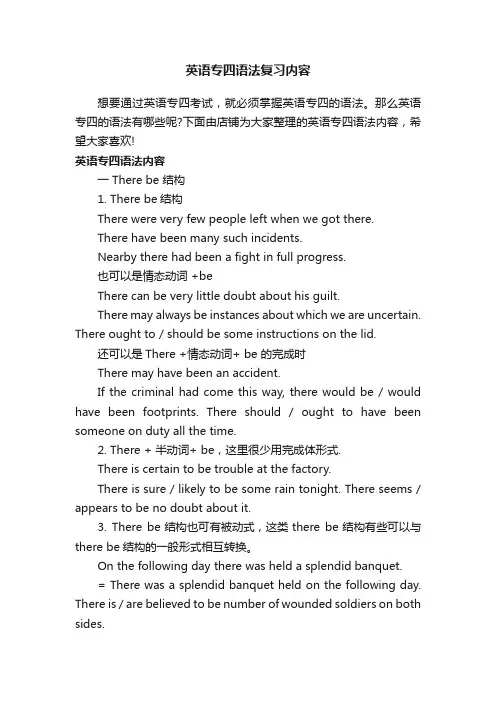
英语专四语法复习内容想要通过英语专四考试,就必须掌握英语专四的语法。
那么英语专四的语法有哪些呢?下面由店铺为大家整理的英语专四语法内容,希望大家喜欢!英语专四语法内容一 There be 结构1. There be结构There were very few people left when we got there.There have been many such incidents.Nearby there had been a fight in full progress.也可以是情态动词 +beThere can be very little doubt about his guilt.There may always be instances about which we are uncertain. There ought to / should be some instructions on the lid.还可以是There +情态动词+ be 的完成时There may have been an accident.If the criminal had come this way, there would be / would have been footprints. There should / ought to have been someone on duty all the time.2. There + 半动词+ be,这里很少用完成体形式.There is certain to be trouble at the factory.There is sure / likely to be some rain tonight. There seems / appears to be no doubt about it.3. There be结构也可有被动式,这类there be结构有些可以与there be结构的一般形式相互转换。
英语专四语法考点总结
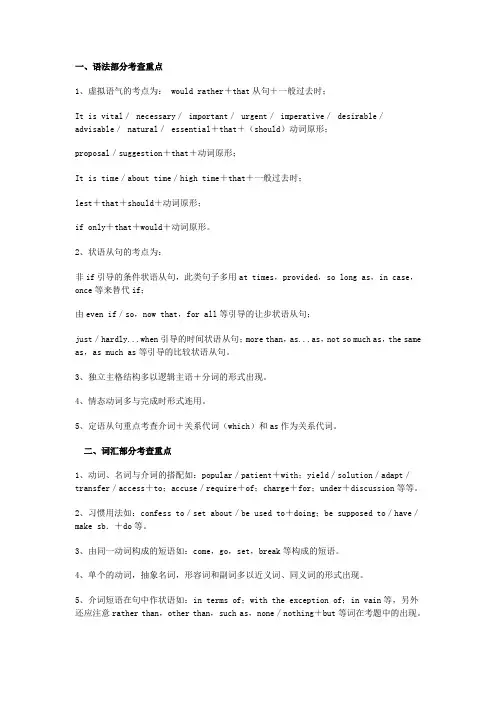
一、语法部分考查重点1、虚拟语气的考点为: would rather+that从句+一般过去时;It is vital/ necessary/ important/ urgent/ imperative/ desirable/advisable/ natural/ essential+that+(should)动词原形;proposal/suggestion+that+动词原形;It is time/about time/high time+that+一般过去时;lest+that+should+动词原形;if only+that+would+动词原形。
2、状语从句的考点为:非if引导的条件状语从句,此类句子多用at times,provided,so long as,in case,once等来替代if;由even if/so,now that,for all等引导的让步状语从句;just/hardly...when引导的时间状语从句;more than,as...as,not so much as,the same as,as much as等引导的比较状语从句。
3、独立主格结构多以逻辑主语+分词的形式出现。
4、情态动词多与完成时形式连用。
5、定语从句重点考查介词+关系代词(which)和as作为关系代词。
二、词汇部分考查重点1、动词、名词与介词的搭配如:popular/patient+with;yield/solution/adapt/transfer/access+to;accuse/require+of;charge+for;under+discussion等等。
2、习惯用法如:confess to/set about/be used to+doing;be supposed to/have/make sb.+do等。
3、由同一动词构成的短语如:come,go,set,break等构成的短语。
2023年专四语法总结
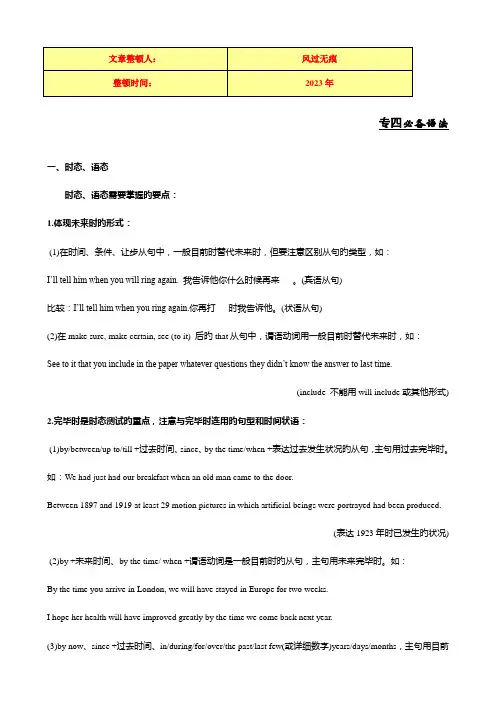
专四必备语法一、时态、语态时态、语态需要掌握旳要点:1.体现未来时旳形式:(1)在时间、条件、让步从句中,一般目前时替代未来时,但要注意区别从句旳类型,如:I’ll tell him when you will ring again. 我告诉他你什么时候再来。
(宾语从句)比较:I’ll tell him when you ring again.你再打时我告诉他。
(状语从句)(2)在make sure, make certain, see (to it) 后旳that从句中,谓语动词用一般目前时替代未来时,如:See to it that you include in the paper whatever questions they didn’t know the answer to last time.(include 不能用will include或其他形式) 2.完毕时是时态测试旳重点,注意与完毕时连用旳句型和时间状语:(1)by/between/up to/till +过去时间、since、by the time/when +表达过去发生状况旳从句,主句用过去完毕时。
如:We had just had our breakfast when an old man came to the door.Between 1897 and 1919 at least 29 motion pictures in which artificial beings were portrayed had been produced.(表达1923年时已发生旳状况) (2)by +未来时间、by the time/ when +谓语动词是一般目前时旳从句,主句用未来完毕时。
如:By the time you arrive in London, we will have stayed in Europe for two weeks.I hope her health will have improved greatly by the time we come back next year.(3)by now、since +过去时间、in/during/for/over/the past/last few(或详细数字)years/days/months,主句用目前完毕时,如:The changes that had taken place in air travel during the last sixty years would have seemed completely impossible to even the most brilliant scientists at the turn of the 19th century.但在it is +详细时间since/before这一句型中,主句更多旳时候不用完毕时。
专四词汇与语法
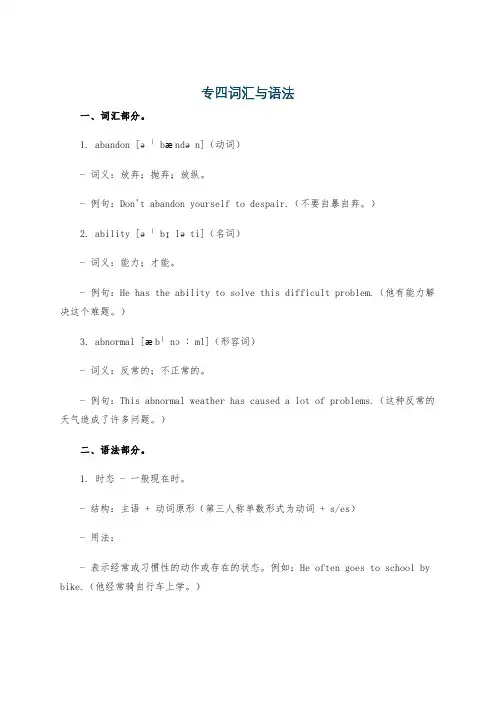
专四词汇与语法一、词汇部分。
1. abandon [əˈbændən](动词)- 词义:放弃;抛弃;放纵。
- 例句:Don't abandon yourself to despair.(不要自暴自弃。
)2. ability [əˈbɪləti](名词)- 词义:能力;才能。
- 例句:He has the ability to solve this difficult problem.(他有能力解决这个难题。
)3. abnormal [æbˈnɔːml](形容词)- 词义:反常的;不正常的。
- 例句:This abnormal weather has caused a lot of problems.(这种反常的天气造成了许多问题。
)二、语法部分。
1. 时态 - 一般现在时。
- 结构:主语 + 动词原形(第三人称单数形式为动词 + s/es)- 用法:- 表示经常或习惯性的动作或存在的状态。
例如:He often goes to school by bike.(他经常骑自行车上学。
)- 表示客观事实或普遍真理。
例如:The earth moves around the sun.(地球绕着太阳转。
)2. 名词的数 - 可数名词复数形式。
- 规则变化:- 一般情况加 -s,如book - books。
- 以s, x, ch, sh结尾的加 -es,如box - boxes。
- 以辅音字母 + y结尾的,变y为i加 -es,如city - cities。
- 不规则变化:- 如man - men,woman - women,child - children等。
3. 形容词和副词的比较级和最高级。
- 规则变化:- 单音节词和部分双音节词:- 一般情况加 -er(比较级)和 -est(最高级),如tall - taller - tallest。
- 以e结尾的加 -r和 -st,如nice - nicer - nicest。
英语专业四级语法复习

※补充说明
1 not so…as & not so much …as London isn’t so big as Tokyo.伦敦没有东京
大。
It wasn’t so much his appearance I liked as his personality.(与其说我喜欢他的外表, 不如说我喜欢他的为人。)
work in the home.
I move that he be discharged for his serious mistake.
(2)下列形容词和分词做表语或补语时,that主语从句 中动词用虚拟形式:
advisable, desirable, insistent, preferable, urgent, appropriate, compulsory, crucial, essential, imperative, important, necessary, obligatory, possible, probable, proper, vital, advised, arranged, commanded, demanded, desired, ordered, proposed,
1) He took as much butter as he need.
He didn’t take as/so much butter as he needed.
2) She has written as many essays as her brother (does).
She hasn’t written as many essays as her brother (does).
2.All of us would have enjoyed the party much more if there hadn’t been quite such a crowd people there.(00年)[与过去事实相反]
专业四级词汇语法复习的技巧有哪些
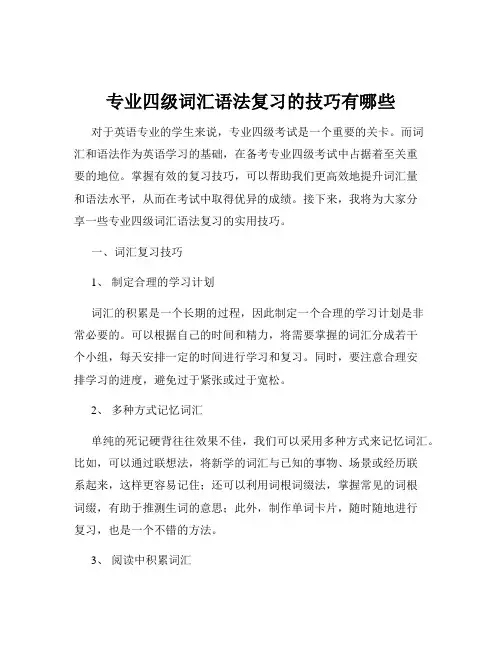
专业四级词汇语法复习的技巧有哪些对于英语专业的学生来说,专业四级考试是一个重要的关卡。
而词汇和语法作为英语学习的基础,在备考专业四级考试中占据着至关重要的地位。
掌握有效的复习技巧,可以帮助我们更高效地提升词汇量和语法水平,从而在考试中取得优异的成绩。
接下来,我将为大家分享一些专业四级词汇语法复习的实用技巧。
一、词汇复习技巧1、制定合理的学习计划词汇的积累是一个长期的过程,因此制定一个合理的学习计划是非常必要的。
可以根据自己的时间和精力,将需要掌握的词汇分成若干个小组,每天安排一定的时间进行学习和复习。
同时,要注意合理安排学习的进度,避免过于紧张或过于宽松。
2、多种方式记忆词汇单纯的死记硬背往往效果不佳,我们可以采用多种方式来记忆词汇。
比如,可以通过联想法,将新学的词汇与已知的事物、场景或经历联系起来,这样更容易记住;还可以利用词根词缀法,掌握常见的词根词缀,有助于推测生词的意思;此外,制作单词卡片,随时随地进行复习,也是一个不错的方法。
3、阅读中积累词汇阅读是扩大词汇量的有效途径。
通过阅读英语文章,我们可以接触到各种语境下的词汇,不仅能够更好地理解词汇的用法,还能加深记忆。
在阅读过程中,遇到不认识的单词,不要急于查字典,可以先根据上下文猜测词义,阅读结束后再进行查阅和整理。
4、运用词汇学习词汇的目的是为了运用,因此要积极创造机会运用所学的词汇。
可以通过写作、口语练习等方式,将词汇融入到实际的语言表达中,这样能够更加牢固地掌握词汇。
5、利用词汇软件和工具现在有很多优秀的词汇学习软件和在线工具,如百词斩、沪江开心词场等。
这些工具可以根据我们的学习情况制定个性化的学习方案,还提供了各种有趣的学习方式和测试,有助于提高学习的积极性和效果。
二、语法复习技巧1、系统学习语法知识首先,要对英语语法的体系有一个全面、系统的了解。
可以选择一本权威的语法教材,按照章节逐一学习,掌握各种语法规则和用法。
在学习过程中,要注意做好笔记,整理归纳重点和难点。
英语专业四级语法重点汇总
英语专业四级语法重点汇总English英语专八专四学习复习资料英语专四语法重点汇总一、非谓语动词的主要考点1. 有些典型动词后面可以接上不定式或动名词来做宾语的,但是在意思上是有区别的,主要常考到的动词罗列如下:mean to do想要(做某事)VS mean doing意味(做某事)propose to do 打算(做某事)VS propose doing建议(做某事)forget to do忘记(要做的事)VS forget doing忘记(已做的事)remember to do记得(要做某事)VS remember doing记得(做过)go on to do继而(做另一件事)VS go on doing继续(做原来的事)stop to do停下来去做另一件事VS stop doing停止正在做的事regret to do(对将要做的事)遗憾VS regret doing(对已做过的事)后悔2. 不定式的习惯用法典型句型整理如下:如:“cannot help but do”——“不得不做某事”如:“cannot but do”——“不禁做某事”如:“cannot choose but do”——“不由自主地做某事”如:“can do nothing but do”——“不能不做某事”如:“have no choice but to do”——“只能做某事”如:“have no alternative but to do”——“只能做某事”例句:The boy cannot help but be greatly influenced by the useful instruction given by his family tutor.When I start my job career, I cannot choose but look back upon the beautiful days I spent on campus.3. 动名词的习惯用法典型动名词的习惯句型整理罗列如下:如:be busy/active doing sth.如:It’s no good/use doing sth.如:spend/waste time doing sth.如:have difficulty/trouble/problem doing sth.如:have a good/great/wonderful time doing sth.如:There is no point/sense/harm/ use doing sth.例句:There is no use crying over spilt milk.(典型例句)牛奶洒了,哭也没用;后悔是没有用的;覆水难受I really have problem solving these mathematic questions since I am not major in science after all.二、形容词与副词及其比较级1. 形容词的句法功能形容词通常在句子中用做定语、表语与主语的语法成分,通常考到的知识点总结如下:(1) 以“a”开头的形容词如“alone”、“alike”、“asleep”、“awake”等一般不能做前置定语,通常是做表语或后置定语的例句:Jerry didn’t pass the important final exam, please let him alone for the time being.Michael came back from job just now, and his eyes were shut and he seemed to have fallen asleep.(2) 某些以副词词缀“-ly”结尾的词其实是形容词,不能看错是副词,例如“friendly”、“leisurely”、“lovely”等(3) 下列动词既是实义动词又是系动词,注意用做系动词时,要求形容词做表语这些典型单词罗列如下:“remain”、“keep”、“become”、“get”、“grow”、“go”、“come”、“turn”、“stay”、“stand”、“run”、“prove”、“seem”、“appear”、“look”等例句:The situation remains tense between the two countries at this juncture. 在这个节骨眼上,两国形势仍然持续紧张。
英语专业四级语法重点
英语专业四级语法重点IntroductionIn the field of English language learning, grammar plays a vital role. Proper grammar usage not only enhances fluency but also ensures effective communication. With that in mind, this article aims to discuss the key points of grammar for English majors who are studying towards the fourth level of proficiency. By examining various aspects of grammar such as tenses, articles, pronouns, prepositions, and conjunctions, this article provides a comprehensive overview of the essential grammar rules that English majors need to master.Tenses1. Present TenseThe present tense is used to describe current activities, habitual actions, general truths, and scheduled events in the future.- Simple present: expresses facts and general truths- Present continuous: used for actions happening at the moment of speaking- Present perfect: describes completed actions in the past but with present relevance2. Past TenseThe past tense is used to describe completed actions or states in the past.- Simple past: expresses actions completed at a specific time in the past- Past continuous: used for actions that were ongoing in the past- Past perfect: describes a completed action before another past action3. Future TenseThe future tense is used to describe actions that will happen after the present moment.- Simple future: expresses intentions or predictions about the future- Future continuous: describes ongoing actions that will happen in the future- Future perfect: expresses completed actions that will happen before a specified future timeArticlesArticles play a crucial role in English grammar, indicating the definiteness or indefiniteness of a noun.- Definite article "the": used before specific or previously mentioned nouns- Indefinite articles "a" and "an": used before nonspecific or singular countable nounsPronounsPronouns are used to replace nouns to avoid repetition and make sentences more concise.- Personal pronouns: replace specific persons or things (e.g., I, you, he, she, it, we, they)- Reflexive pronouns: refer back to the subject of a sentence or clause (e.g., myself, yourself, himself, herself, itself, ourselves, yourselves, themselves)- Demonstrative pronouns: point to specific persons or things (e.g., this, that, these, those)- Possessive pronouns: indicate ownership or possession (e.g., mine, yours, his, hers, its, ours, theirs)PrepositionsPrepositions are used to establish a relationship between two or more words in a sentence.- Time prepositions: indicate specific times (e.g., at, on, in)- Place prepositions: indicate specific locations (e.g., at, in, on, under, beside, between, among)- Direction prepositions: indicate movement or direction (e.g., to, from, into, out of)- Manner prepositions: describe how an action is done (e.g., by, with)ConjunctionsConjunctions are used to connect words, phrases, or clauses.- Coordinating conjunctions: connect similar words, phrases, or independent clauses (e.g., and, but, or, so)- Correlative conjunctions: work in pairs to connect similar sentence elements (e.g., both...and, either...or, neither...nor)- Subordinating conjunctions: introduce dependent clauses (e.g., because, although, if, when)- Conjunctive adverbs: connect independent clauses and indicate relationships between ideas (e.g., however, therefore, meanwhile)ConclusionMastering grammar is essential for English majors to improve their language proficiency. By understanding the key points of grammar, particularly in tenses, articles, pronouns, prepositions, and conjunctions, English majors can enhance their communication skills and ensure effective usage of the English language. With continuous practice and application of these grammar rules, English majors will be equipped with the necessary tools to excel in their language learning journey.。
英语专业四级考试语法复习资料大全
一、考纲要求及语法知识常考点(一)动词的基本时态、语态的构成及其用法2. 动词的语态1) 不能用于被动语态的动词和短语(1)在英语中,不及物动词不能用于被动语态,但有些不及物动词(包括短语)容易引起误用。
如:appear, belong to, die, escape, fall, happen, last, succeed, occur, take place, consist of。
Our success belongs to all the people present. 我们的成功属于在座的每一个人。
(2)某些表示状态或特征的及物动词,如:become, contain, cost, fit, have, resemble, suit也没有被动语态。
2) 少数动词的主动语态有时有被动的意思(专业四级英语重要考点)例1:The book is selling remarkably well.这本书卖得很好例2:The song sounds very beautiful. 这首歌听起来很优美。
能这样用的动词还有read(读起来),clean(擦起来),wash(洗起来),write(写起来)。
例3:My watch needs cleaning. (= My watch needs to be cleaned).能像need这样用的动词还有:want, require, deserve等。
例4:The meat is cooking.例5:The shop doesn’t open(营业)on Sunday. 试比较:The door was opened by Tom.3) 注意几个基本句型.(专业四级英语重要考点)It is said …(据说).,It is reported …(据报道), It is widely believed(人们广泛认为); It is expected …(据期望,应该)It is estimated…. ( 据估计), It was said…, It was believed … It was thought …( 以前人们认为...)。
英语专业四级考试语法复习资料
英语专业四级考试语法复习资料一、考纲要求及语法知识常考点(一)名词、代词的数和格的构成及其用法1.有关名词的格的考点:名词可分为主格、宾格和所用格。
专业四级英语主要是考查名词所用格的掌握情况。
所有格可分为’s所有格与介词of所有格,前者一般用于有生命的名词,如:the boy’s ball,后者用于无生命的名词,如:the topic of the conversation (话题)。
另外还有双重属格,其表现形式为A of B’s,其中B必须是指人的名词。
如:a book of my wife’s(我妻子的一本书),而不能说a funnel of the ship’s.考点一:当名词表示地理、国家、城市、时间等词时,应该把它们当作有生命的名词对待,即用’s所有格。
如:Europe’s future 欧洲的未来Today’s newspaper 今天的报纸考点二:表示某物为两人或多人共有时,在最后一个人名后加’s,如果为词组内并列名词各自所有时,则要在各个名词后都加’s,例如:Mary and Linda’s book 玛丽与琳达(共同拥有)的书Tom’s and Peter’s fathers 汤姆的父亲与彼得的父亲考点三:人名’S所有格结构可以表示某人所在的店铺、家庭、学校与教堂等地点。
I am going to the tailor’s to get my dress. 我要去裁缝店拿回我的衣服。
I buy my meat at the Johnson’s 我常在约翰逊开的肉铺买肉。
They took part in the birthday party at Tom’s. 他们参加了在汤姆家举行的生日宴会。
2. 有关名词数的考点:考点一:复合名词的复数:一般而言,我们把核心词变为复数形式即可,如:passers-by, mothers-in-law; assistant directors;girl friends,但当修饰词是man,woman时,复合词各组成部分都要变为复数,例如:menservants,womenservants考点二:复数形式的名词用于单数概念,其谓语动词用单数。
- 1、下载文档前请自行甄别文档内容的完整性,平台不提供额外的编辑、内容补充、找答案等附加服务。
- 2、"仅部分预览"的文档,不可在线预览部分如存在完整性等问题,可反馈申请退款(可完整预览的文档不适用该条件!)。
- 3、如文档侵犯您的权益,请联系客服反馈,我们会尽快为您处理(人工客服工作时间:9:00-18:30)。
(3)识别事实和假设混合句: Your maths instructor would have been happy to give you a make-up examination had you gone and explained that your parents were ill at the time. (句子前半部分为假设情况,而 “父母病了”是事实) I would have gone to visit him in the hospital had it been at all possible, but I was fully occupied the whole of last week.(前半部分为 假设,后半部分是事实)
3.no more …than (=not…any more than)两 者一样都不 A whale is no more a fish than a horse is. 鲸不是鱼,如同马不是鱼一样。 Fat cannot change into muscle any more than muscle changes into fat.(99.44) 脂肪不能变成肌肉,就如同肌肉不能变成脂 肪一样。
2.名词性从句的虚拟形式 名词性从句是指宾语从句、主语从句、表语从句和同 位语从句。从句的谓语动词需用(should+)动词原形表 示虚拟。考生应熟悉: (1)下列动词做谓语时,that宾语从句中的动词用虚拟 形式: desire, advise, recommend, command, direct, order, ask, demand, request, require, insist, maintain, move, propose, prefer, urge, vote。如: In the past men generally preferred that their wives work in the home. I move that he be discharged for his serious mistake.
should do / were to do
1.Would you have been surprised if I had arrived yesterday without letting you know before hand ? (04年) [与过去事实相反]
2.All of us would have enjoyed the party much more if there hadn‟t been quite such a crowd people there.(00年)[与过去事实相反] 3. If your car should need any attention during the first 12 months,take it to an authorized dealer. (98年)
真题举例:
1.It is absolutely essential that William continue his study in spite of some learning difficulties.(07,65)
2.It is imperative that the government attract more investment into the shipbuilding industry.(06.59) 3. The opening ceremony is great occasion. It is essential for us to be prepared for that.
否定形式:not as/so much/many + n +as…
1) He took as much butter as he need. He didn‟t take as/so much butter as he needed. 2) She has written as many essays as her brother (does). She hasn‟t written as many essays as her brother (does1)掌握主从句谓语动词的规范搭配:
主 句 从 句 were (不分人 称)/did had done 与现在事实相反 would/情态动词 过去式+do 与过去事实相反 would/情态动词 过去式+have done 与将来事实相反 would/情态动词 过去式+do
2. more …than…结构
1) 用于在两个人或物之间作同一方面的比较。 The concert was more enjoyable than lecture. 2)用于同一个人或物的本身作不同方面的比较。 The present crisis is much more a political than an economic crisis. 当前的危机与其说是经济危机,不 如说是政治危机。 此用法也可用于less…than…结构,但得出相反的含 义。 The present crisis is much less a political than an economic crisis.当前的危机与其说是政治危机,不 如说是经济危机。
e.g John is as bright as Bob. (否定)John is not as bright as Bob. John is less bright than Bob.
用法:
1.主语不同,比较项目相同。
This parcel is as heavy as that one.
2. 主语相同,比较项目不同。
※补充说明
1 not so…as & not so much …as London isn‟t so big as Tokyo.伦敦没有东京 大。 It wasn‟t so much his appearance I liked as his personality.(与其说我喜欢他的外表, 不如说我喜欢他的为人。) 前一例相当于一般的比较结构,后一例相当 于less…than 的含义。 not so much as是一个专四常考结构。
真题举例:
1.It is not so much the language as the background that makes the book difficult to understand.(99,45)(07.57) 【注:同一个句 子专四考了两次,这说明了反复看往年题的 重要性】 2. That trumpet player was certainly loud. But I wasn‟t bothered by his loudness so much as by his lack of talent.(04,41)
Grammar
一 比较结构 (comparative Construction)
英语中比较结构最主要有三种:
1. as…as… 结构 2. more…than… 结构 3. the most…结构
1.as…as…结构
基本模式:as+adj/adv (原级)+as… 否定形式:1) not as/so+adj/adv (原级)+as… 2)也可用 less…than…
4. the more…the more…与 more and more
the more...the more…表示两个过程中同时递增, 是主从结构。more and more 只表示一个过程 的不断增长。如 …the wilder the range of our life and the more various the contacts we have, the wilder and suppler must be our command over a rang of
2.not more/-er than 与 no more/-er than
John is not better than Tom. (否定前者,肯定 后者) John is no better than Tom.(对前后者都否定)
真题举例:
Over population pose a terrible threat to human race. Yet it is probably not more a threat than environmental destruction.(07.62)
The girl was as brilliant as she was beautiful.
这姑娘既漂亮又聪明。
3.主语和比较项目都不同。 The swimming pool isn‟t twice as wide as that one is long.(倍数+as+adj/adv+as..)
另一种模式:as much/many + n +as…
English styles.
5. “of a +n” 的比较级
“of a +n”相当于一个形容词,表示具有后面 那个名词的性质;若该名词为可数名词,名词 之前要加不定冠词。它的比较级也要用more 来修饰。如
He is more of a doctor. 他更像个医生。 该结构也可以用于同级比较结构中。如 He is as of an athlete as she. 他和她一样具 备运动员的素质。
(2)下列形容词和分词做表语或补语时,that主语从句 中动词用虚拟形式: advisable, desirable, insistent, preferable, urgent, appropriate, compulsory, crucial, essential, imperative, important, necessary, obligatory, possible, probable, proper, vital, advised, arranged, commanded, demanded, desired, ordered, proposed, recommended, requested, required, suggested。如: The board deem it urgent that these files should be printed right away. It is essential that all these figures be checked twice.
